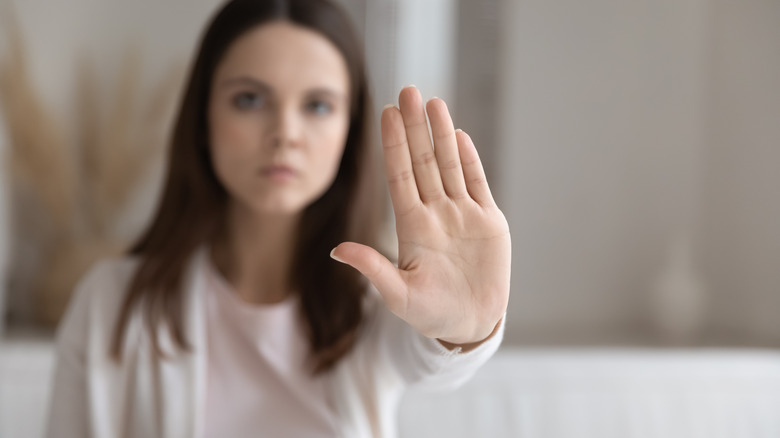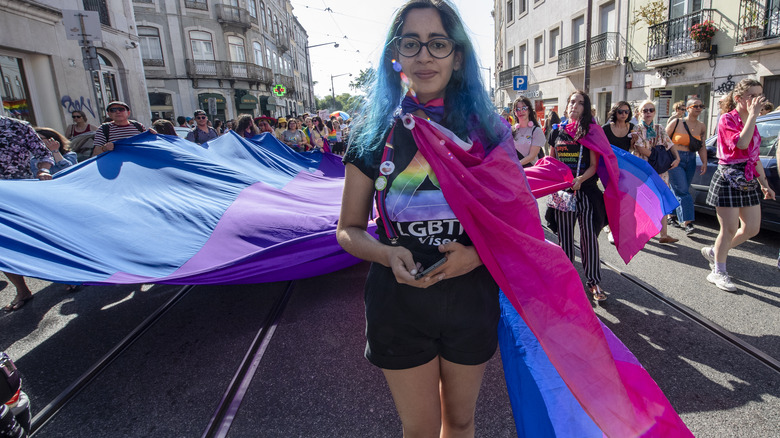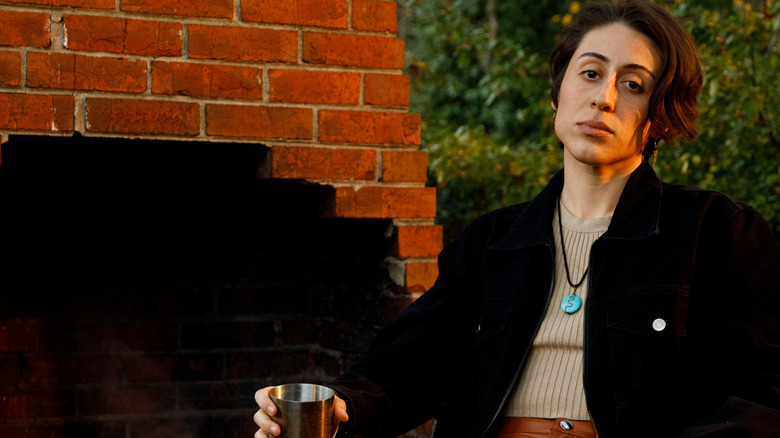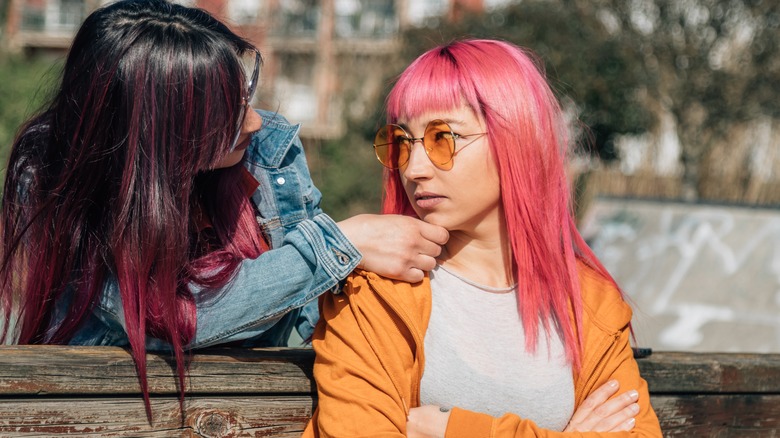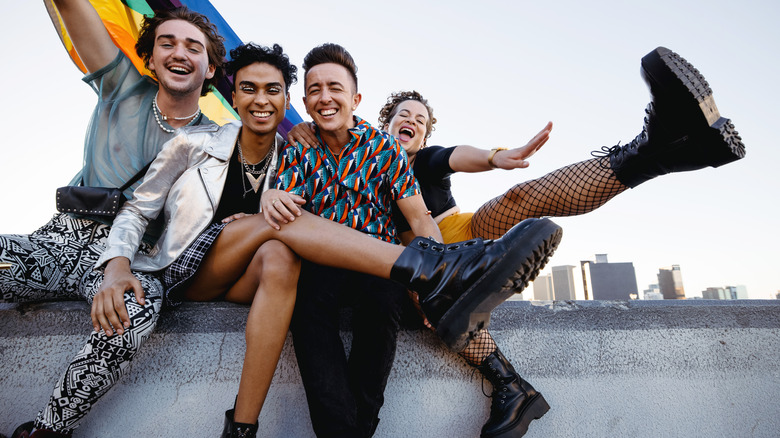Gatekeeping LGBTQ+ Identities Isn't Just Annoying, It's Harmful
A gatekeeper is "a person or thing that controls access, as to information, often acting as an arbiter of quality or legitimacy" per Dictionary.com. Many times, this happens in the workplace, the entertainment industry, and even among friend groups. However, gatekeeping sexuality is the same concept but applied to the LGBTQ+ community. Within the community, gatekeeping can show up as being told or made to feel one is 'not queer enough.'
For instance in gay male culture, there can be a strong preference for — and an inner grappling with — ideals of masculinity. This can lead to discrimination against more feminine-presenting men. In lesbian communities, there may be for some a sense of exclusionary pride at being a 'gold star' lesbian, one who's only had sex with women, or who won't date those who've slept with men.
And for bisexuals, there is outright discrimination from the queer community, a lack of compassion and understanding that bisexuality is real and not an experiment or a confused identity. In each case, members of the queer community are excluding fellow members, causing distress, possibly depression, and isolation. Isolation and feelings of abandonment are painful. Gatekeeping is an added insult during this already difficult time for the LGBTQ+ community.
How gatekeeping isolates bisexuals
Any historically marginalized or devalued group — women, people of color, the extended gay community — has some percentage of its own members who buy into the narrative that they're somehow inferior (and then fling that label at others). This internalized oppression is essentially a minority agreeing to an ugly definition from the majority culture that minorities are inherently second-rate.
An internet search for 'biphobia' yields an unfortunate bounty of people sharing their rejection stories after coming out as bi to gay or bisexual people. On Reddit, a woman recalls going to a queer prom event and connecting well with a group of queer women. One of them complimented the woman's homemade crown, who thanked her and said she'd made it from a bi-pride flag. She excused herself, then when she enthusiastically rejoined the women, they ignored her and walked away. In the 2018 study, "Bisexual prejudice among lesbian and gay people," the authors found the negativity of lesbians towards bi women emerged from a belief that bisexuals are more attracted to men. This misunderstanding fuels stereotypes that all bisexuals prefer the "straight option." This belief that bi women are actually straight is a common myth about bisexuality.
Bisexuals who happen to be coupled with an opposite-sex partner can be insulted for being "straight-passing." Those who identify as queer but haven't yet had a relationship can be unfairly shunned. The feeling that you may not be "queer enough" as a newbie just adds to the complicated emotions that surround coming out.
Gatekeeping is devastating to the trans community
The attitude from the medical community toward medically treating trans and non-binary people is creating an unnecessary health crisis for the trans community. Trans patients can be directly denied care without a real reason, with doctors citing a fear that they'll be sued. Healthcare gatekeepers might insist someone use the gender assigned at birth as their identity, a deliberate denial of a trans person's internal reality.
A lack of education is behind much of this bias. A trans-non-binary person, Corey Brooks, used they/them pronouns at the doctor's office. The physician's response was hostile, and Brooks shared with the Washington Post, "As a trans person, that's unfortunately not uncommon where you're expected to provide all of this education for your providers."
Within the LGBTQ+ community, in a historical, public instance of exclusion, trans woman Sylvia Rivera was booed at a 1973 liberation march by lesbians who didn't want to share the stage with a drag queen. In 2013, the Human Rights Campaign insisted an activist remove a transgender flag from the view of TV cameras at a rally. Unfortunately, this trans exclusion is still a worldwide phenomenon with studies showing that this subgroup is often dismissed or even excluded from activism efforts.
How homophobia isolates people from their own community
Internalized homophobia, an expression of internalized oppression, is what happens when gay people accept the judgments from a society that homosexuality and transgender expressions — in all their myriad forms — are wrong or immoral and that heterosexuality is simply more 'correct.' It can lead to self-hatred, which fosters internal decay. It's easier from a self-hating mindset to become bitter toward others, especially those who appear straight or somehow have an "easier" road.
The consequences of homophobia create intense forms of isolation. This inner fear or denial of one's orientation can lead to social and developmental delays, including coming out much later in life. People's self-esteem gets undermined and they may have body image issues. They may erase themselves from the community by insisting on living a straight life despite a strong desire to be who they are. And in terms of gatekeeping sexuality, people with excessive and unchallenged homophobia can be the loudest voices to attack the LGBTQ+ community. In a stunning example of this, former Senator Larry Craig, with a staunch record of voting against gay rights, was arrested in an airport bathroom for soliciting sex from a man — an undercover cop, as it turned out.
Inclusion and stereotype-busting: the opposite of gatekeeping
No community is a monolith. But we may need to make an extra effort to be more inclusive. There is incredible diversity in the LGBTQ+ community.
This is why queer representation is so powerful and eye-opening. On her YouTube channel, Cammie Scott talks about her experiences as a super feminine gay woman. She's defiantly open and counters stereotypes about what a lesbian can look and sound like. Now this is exactly where we need to apply the most maturity — her lived experience doesn't in any way discount or diminish the very real challenges of being a more masculine presenting gay, bi, asexual, or pansexual woman. All experiences are valid; it's not a competition. In fact, in the 1940s, researcher Alfred Kinsey discovered that sexuality exists on a wide spectrum from straight to gay. The Kinsey Scale was one of the more compassionate contributions to sociology. It also expanded our understanding that the spectrum of human sexuality exists beyond mere touch and extends into fantasy and lust. This spectrum is an invitation for us to be more accepting and welcoming towards ourselves so the world can be too.
People naturally fall along a huge range of how 'gay' or 'straight' they sound and look. Clothing may be festooned with rainbow pins or quietly conservative. Folks may work in hair salons, stand up comedy, use their Ph.D. to teach grad school or run giant corporations like Jim Fitterling, the openly gay CEO of Dow Chemical. There's no "right way" to be a member of the LGBTQ+ community, and recognizing that can make for a more inclusive experience for everyone.
